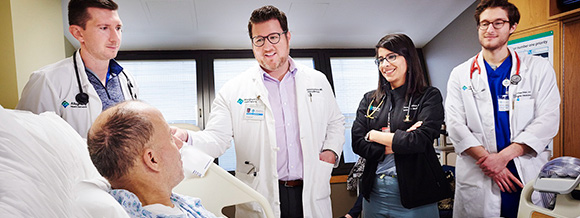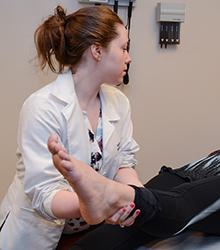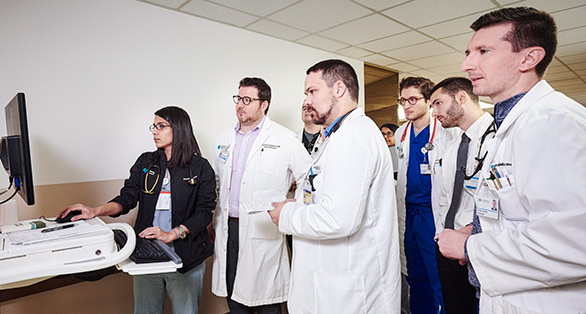Internal Medicine Residency Clinical Experiences

Our program gives you ample opportunity to become a great physician by providing you with access to a diverse patient population who present with a wide array of clinical conditions. Below are descriptions of the rotations you will experience as a categorical resident in our program.
Our 4:1 rotation schedule
Our innovative 4:1 rotation schedule provides you with the best of both worlds: a robust outpatient experience by enhancing continuity in the clinic experience while minimizing the outpatient duties of residents when you are on inpatient rotations.
The benefits of the 4:1 schedule include:
- Better Continuity of Care: You will never be pulled from service and rushed to sign out your patients so you can make clinic. By separating inpatient and outpatient experiences in this way, the 4:1 improves care, and safety
- Improved Outpatient Experience: In a conventional system, you would have clinic for one half-day once a week. Under the 4:1 schedule, you have a dedicated week in which in which to see your panel of patients. This allows you to focus on providing the best outpatient care without concern for managing patients in the hospital. The 4:1 schedule also provides a “break” from daily life inside the hospital; the schedule is lighter, but still demanding and challenging.
- Greater Exposure to Staff and Teaching Modalities: With the 4:1 schedule, you and your team members will rotate. As an intern, this allows you to experience different teaching styles and, as a senior, it allows you to teach and manage a greater number of interns. This rotating structure encourages more interaction between you and your peers, and helps build a stronger community.
Point of Care Ultrasound training
Our Program is committed to providing longitudinal education in point-of-care ultrasound (POCUS) for our residents and faculty. Led by Dr. Thomas Robertson, the Director of Ultrasound Education and expert in the field, our multidisciplinary teaching team includes faculty from internal medicine, cardiology, pulmonary/critical care, radiology, and emergency medicine. Our goal is to provide you with education in POCUS image acquisition, the ability to interpret those images, and appropriate clinical integration at the bedside and in the clinic. We have a state of the art ultrasound on the inpatient teaching floor at AGH, handheld devices at AGH and West Penn hospitals, both of our primary care clinics, and many faculty are also equipped with their own ultrasound.
We will help you develop a framework for POCUS starting with an intensive hands-on training early in each academic year, and will expand your knowledge through POCUS conferences and participation in the Ultrasound Interest Group. Your skills will be enhanced through regular hands-on scanning with POCUS faculty on the wards and in the clinic. Integrating POCUS as a component of a complex clinical assessment will empower you to use this skill safely and appropriately throughout your career.
Core Rotations
Our core rotations are designed to cover the fundamentals of internal medicine residency while giving you the opportunity to augment your education with elective rotations. Our core rotations are as follows:
Ambulatory Care

Night Medicine
Night medicine contributes to the coverage of patients at Allegheny General and West Penn Hospitals. This rotation ensures continuity of care for inpatients, while ensuring that you and your co-residents remain well within duty hours.
On the night team, you will admit patients and provide cross coverage for the daytime teaching teams. Your shift will be from 7 p.m. to 7 a.m. and end ends with sign out to the day teams. The night team is supervised by an overnight attending at both sites.
Emergency Medicine
As a first-year resident, you will spend one block rotating in Emergency Medicine at Allegheny General Hospital. Working alongside EM attendings and residents, you will have the opportunity to see patients with common ED problems. As the initial physician, you will have the unique opportunity to see and treat variety of acute medical and surgical illnesses under the supervision of emergency medicine attending physicians.
By the end of your EM rotation you will learn how to:
- Approach emergency patients
- Manage multiple patients
- Recognize and triage ill patients
- Manage patients acutely
Intensive Care
Medical Intensive Care Medicine
You will gain excellent critical care experience in the AGH Medical Intensive Care Unit (MICU) with two teams of two interns, a senior resident, a pulmonary-critical care fellow, and an attending physicians who round 7-days a week.
Interns and senior residents provide day coverage while the night MICU team provides coverage overnight. Pulmonary and critical care fellows provide 24-hour in-house coverage. As part of the MICU team, you will take primary responsibility for managing critically-ill patients and will be performing most of their diagnostic procedures. During your MICU rotation you and your team will learn the following:
- Techniques of resuscitation
- Intubation
- Central line insertion
- Arterial line insertion
- Ventilator management
- Bedside hemodynamics
- How to manage acutely ill medical patients
Cardiac Care
Our newly renovated Cardiac Care Unit (CCU) provides cares for patients with acute heart failure, myocardial infarction, unstable angina, and cardiogenic shock. You will have opportunities to manage patients with heart transplants, LVAD, balloon pumps, temporary pacemakers, Impella, and ECMO.
The CCU is staffed by senior residents, a cardiology fellow, and cardiology attendings. Overnight coverage is provided in weekly blocks by an assigned senior resident. The cardiology fellows provide 24-hour in-house coverage.
During this rotation you will learn:
- Techniques for electrical and chemical cardioversion of arrhythmias
- Swan-Ganz catheter insertion
- Central line insertion
- Arterial line insertion
- Cardiac resuscitation
- EKG interpretation
- Principles of cardiac emergency therapy
- Management of acute cardiac illness
Hematology/Oncology
In your second year, under the supervision of a hematology/oncology fellow and an attending hematologist/oncologist, you and a peer will spend four weeks rotating through our hematology and oncology services. You will care for a spectrum of patients, starting from diagnosis, and spanning all facets of the disease. Our clinical sites include the Medical Oncology unit at Allegheny General Hospital and the Bone Marrow Transplant unit at West Penn Hospital, where CAR-T therapy is currently in use.
Quality Improvement and Patient Safety Course (QIPS)
We are committed to preparing you to practice independently in the new era of healthcare, providing you with a comprehensive approach to education, and integrating you in activities that promote quality improvement and patient safety (QIPS).
During your second year, you will complete our two-week intensive QIPS rotation. Here, you will undertake IHI training, a series of modules that introduce you to the fundamentals of patient safety and quality improvement. You will also complete a module on diagnostic errors that will teach you to consider the cognitive biases that contribute to error in addition to the system factors. This will culminate in attainment of skills to develop a fishbone diagram, and aid root-cause analyses.
During the rotation, you will participate in serious event reviews, live root cause analyses, and a variety of activities designed to bring you to the forefront of quality and safety theory and practice. Many projects are presented at our monthly QIPS conference; in fact, these projects often go on to be presented at regional and national conferences.
While this course is the cornerstone of our approach, your immersion into our quality and safety culture will begin during intern orientation and continue throughout your residency through curated activities and experiences.
Neurology
In your second year, you will complete a neurology rotation that provides extensive exposure and management opportunities for an array of neurological disorders. Half of your rotation will be spent with our Stroke Team, working alongside a stroke specialists and neurology residents. As a Comprehensive Stroke Center, you will be exposed to innovative interventional neurology, and neuroradiology imaging and therapies, and will achieve NIHSS Certification. The second part of your rotation will be on the general neurology service, where you will learn about, diagnose, and treat, both common and rare neurological disorders.
Geriatrics
In your second and third years, you will complete geriatrics rotations, where you will work directly with attending geriatricians rounding at nursing homes, providing care in a geriatric clinic, as well as an inpatient geriatric trauma service. In geriatrics you will learn more about:
- Wound care
- Low vision rehabilitation
- Audiology
- PT/OT/SLP therapy
- Movement disorders
- Palliative care (1-week rotation)
- Inpatient consults (1-week rotation)
Medical Consults

As a third-year resident, you will rotate through general medicine consults for one block . This rotation will expose you to preoperative and postoperative inpatient management, and will ensure that you develop expertise in the clinical and interpersonal skills essential to risk stratifying patients across the spectrum of risk, and through any complications.
You will work closely with a core group of faculty from the Center for Perioperative Medicine and Hospitalist Consult Service.
You will:
- Evaluate patients’ known medical problems
- Assess associated surgical risks
- Address previously unrecognized medical problems
- Optimize treatment of all medical problems prior to surgery
- Assist in the management of post-operative complications
Elective Rotations
In addition to our core rotations, we have optimized elective time so you can tailor your residency experience to meet your career goals; whether you want to subspecialize, serve patients in a primary care setting, practice as a hospitalist, or develop into a clinician researcher. Each year of your training, you will have between 8-10 weeks of dedicated elective time which you can fill with rotations from an expansive list of specialties at our core clinical sites, or at any site across our network and community.
Global Health Elective
Third-year residents are able to apply for a special, GME-approved, 4-week global health elective in Georgetown, Guyana. Residents will see unique pathology across the spectrum of healthcare encounters, from outpatient to the ICU, including TB, opportunistic infections, and tropical diseases like malaria and dengue. Residents will also do procedures at the bedside and robust educational opportunities teaching and learning from local residents and medical students. Preparation for the elective includes a global health bootcamp.
IHS Elective
Third-year residents are able to apply for a unique 4-week elective set in Chinle, Arizona on a Navajo reservation. Residents will live and work on the reservation at outpatient and urgent care clinics at the Chinle Comprehensive Healthcare Facility. Housing is provided at no cost for this incredible experience.
Our program offers excellent training in the outpatient setting to prepare you for a career in primary care or outpatient-based specialties. In our two ambulatory clinics, you will have the opportunity to deliver ongoing care to a panel of patients in a setting similar to what you would encounter in private practice.
Our curriculum places you in a variety of outpatient clinics throughout your residency. When you join us, you will be assigned to a primary care site where you will be exposed to the spectrum of primary care during your ambulatory weeks.
Your ambulatory week will consist of 5 half-days at the primary clinic and one half day of didactics. The rest of your week will be spent rotating through a variety of subspecialty clinics throughout the community.
The educational portion of your ambulatory rotation will consist of longitudinal lectures, online modules, and an ambulatory academic half-day.
General Medicine
During the general medicine rotation, you will gain knowledge of health promotion, disease prevention, diagnosis, and treatment. As a quaternary referral center, your patients will come from the local community, often with common internal medicine conditions such as heart failure, pneumonia, and COPD exacerbations, as well as more complex patients, often transferred from outlying facilities via ground and helicopter.
On the general medical floors, your team will consist of an attending, a PGY-2 or PGY-3 resident, two interns, and third- and fourth-year medical students. Interns and senior residents provide day coverage while the Night Medicine team provides overnight coverage.
On rounds, the attending physician will review the presentation and management of patients with the team. You will discuss the epidemiology, clinical manifestations, pathophysiology, diagnoses and evaluations, treatments, and prognoses of the medical conditions affecting your patients. Discussions will also include relevant and recent literature.

